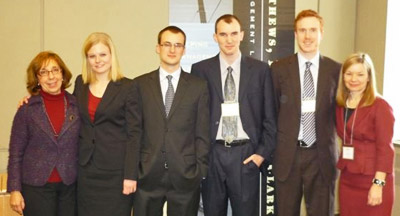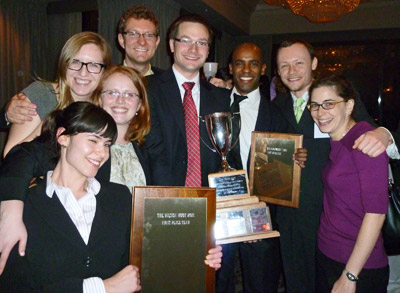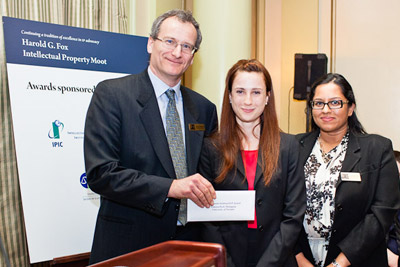University of Toronto Faculty of Law teams have had some significant wins in this year's student moots and competitions.

Canadian Labour Arbitration Competition finalists: L-R: Paula Knopf (Osgoode coach), Allison MacIsaac (Osgoode mooter), Kyle Rees (Osgoode mooter), Andrew Vey (UT mooter), Tim Hughes (UT mooter), Laura Trachuk (UT coach)
In the Canadian Labour Arbitration Competition, on January 30, 2011, Tim Hughes and Andrew Vey placed first after three rounds of vigorous competition, including an exciting final round before the Chairs of the Ontario Labour Relations Board, the Canada Industrial Relations Board, and the Human Rights Tribunal of Ontario. Andrew and Tim had to switch roles over the weekend, representing both union and management in alternating rounds. Their eloquent and unyielding management arguments won them the final after excellent and articulate arguments from the other finalist, Osgoode Hall. The team wishes to extend many thanks to its excellent coach, Laura Trachuk, to Mike Laskey, their student coach, and to the arbitrators and advocates (including Professor Brian Langille) who helped them prepare.
In the Client Counseling Competition on February 20, 2011, the U of T team, consisting of Justin Nasseri and Daniel Goldbloom, competed in a regional competition, including teams from both Canada and the United States. Our team was selected at an intra-mural competition hosted by Borden Ladner Gervais. Staff Lawyers at Downtown Legal Services, Karen Bellinger, Kristin Marshall, and Claire Hepburn worked with Justin and Daniel, who came in first overall in the region. They now have the opportunity to compete in the international competition, in the Netherlands, as the top team from Canada.
On February 26, 2011, the University of Toronto Wilson Moot team took first place in the competition. The team included Emily Bala, Lwam Ghebrehariat, Adrian Johnston, and Jessica Lithwick. Adrian Johnston was the first place oralist and Emily Bala placed third. The final round saw the U of T victorious over Osgoode Hall Law School before a panel consisting of Justice Ian Binnie of the Supreme Court of Canada, Justice Gloria Epstein of the Ontario Court of Appeal, and the Honourable Wallace Oppal, Q.C.

U of T Wilson Moot team, from L-R: Jessica Lithwick (team member), Emily Bala (team member), Becca McConchie (student coach), David Forsayeth (student coach), Adrian Johnston (team member), Lwam Ghebrehariat (team member), Dan Rohde (student coach), Lindsay Beck (student coach)
The Wilson Moot was established in 1992 to honour the outstanding contribution to Canadian law made by Madam Justice Bertha Wilson. The spirit of this moot is to promote justice for those traditionally disempowered within the legal system, and, in particular, to explore legal issues concerning women and minorities. This year’s problem involved a Section One Charter challenge to the Civil Marriage Act.
Our team was ably coached by last year’s Wilson Mooters, Lindsay Beck, David Forsayeth, Becca McConchie, and Dan Rohde. Cheryl Milne, the Executive Director of the Asper Centre for Constitutional Rights, and Professor Lorraine Weinrib worked with the team as they prepared their factum and their oral arguments.
Also on February 26, 2011, the University of Toronto won the Gale Cup Moot. The Gale problem was an appeal from the Supreme Court of Canada decision in R. v. Morelli, a case about the validity of a search warrant issued for evidence of possession of child pornography. Lauren Epstein and Jay Potter addressed the abstract issue of what constitutes control and possession over a digital image. Wayne Cunningham and Akash Toprani took on fact- and policy-heavy questions about the standard to which the police should be held when seeking a search warrant, as well as exclusion of evidence under s. 24(2) of the Charter. Based on their splendid combined performances, the team advanced to the finals, where we drew Respondents. Lauren and Wayne argued in front of a panel consisting of McLachlin J. from the Supreme Court, Feldman J.A. from the Ontario Court of Appeal, and Hesler J.A. from the Quebec Court of Appeal. Despite a very unfavourable last-minute modification to the facts, Lauren and Wayne impressed the bench and won the day!
The Gale Cup is the oldest national moot in Canada, and one of the largest, with 18 schools attending this year. This is U of T's first victory since 2005, and hopefully the first of many more! Thanks to the student coaches, Patric Senson, Sinziana Tugulea, Cherrine Chow, and Adam Tanel. And a special thanks to the head coaches, Michael Dineen of Rusonik, O'Connor, and Karen Bellinger from DLS.
On Saturday Feb. 19, 2011, U of T teams came in second in two moot competitions that the Faculty entered for the first time: the Willms & Shier Environmental Law Moot and the Harold G. Fox Intellectual Property Moot. Their achievement is all the more remarkable given that because the competitions were newly added, these students did not have former participants acting as student coaches to help them prepare.
Heather Burnett, Camille Labchuk, Joanna Kyriazis and Ryan Walker spent months learning about measuring damages for contaminated land in preparation for the Willms & Shier Environmental Law Moot - Canada's first-ever national environmental law moot court competition, which was held at the Ontario Court of Appeal. Ultimately, the team of Heather Burnett and Camille Labchuk placed second in the competition and advanced to the final round, where they pleaded before Justice Thomas A. Cromwell of the Supreme Court of Canada, Justices Michael J. Moldaver and Robert P. Armstrong of the Ontario Court of Appeal, Justice Katherine M. van Rensburg of the Ontario Court of Justice, and Toby Vigod, former Chair of the Ontario Environmental Review Tribunal.
Equally impressive, Joanna Kyriazis and Ryan Walker won the Barry Nelson Spiegel Award for Best Appellant's Factum. The Environmental Law Moot teams were grateful to their faculty advisors, Laura Zizzo and Travis Allan of Zizzo Allan Climate Law.
In the other competition the law school entered for the first time this year, Arya Ghadimi, Vanessa Park-Thompson, Kenneth Raddatz, and David Yi explored bounds of trade-mark law (and the limits of the law of passing off) in protecting functional objects in the third annual Harold G. Fox Intellectual Property Moot, held in the Federal Court Building. Vanessa Park-Thompson and Kenneth Raddatz made it all the way to the finals, ultimately placing second. Vanessa Park-Thompson won the Dimock Stratton LLP Award for the Best Mooter (non-graduating). The team relied heavily on their “amazing” Adjunct Mooting Advisors, Andrew Shaughnessy and Peter Wilcox of Torys.

Vanessa Park-Thompson being awarded the Dimock Stratton LLP Award for the Best Mooter (non-graduating) at the Fox Moot
University of Toronto Faculty of Law students also competed for the very first time in the International Competition for Mediation Advocacy this past March 7-11 in Toronto. The U of T team placed fifth out of nearly 20 law schools across Canada and the United States. This is a remarkable achievement given that our team was comprised of first year students who were up against almost exclusively upper year students from significant mediation training programs.
Jonathan Bright, Anna Cooper, Elizabeth Park, and Sameer Nurmohamed spent several months learning the skills of mediation advocacy and several different areas of law that they were required to prepare. It was a gruelling week of competition with the students being required to prepare for and compete in three different mediation preliminary rounds. The top 8 teams, which included our U of T team, advanced to the quarter finals. We narrowly missed advancing to the semi finals, placing 5th overall. Adjunct faculty advisor Jane Kidner said; “These students were exceptional both in their command of the law and in their understanding and demonstration of mediation advocacy skills. They did remarkably well and represented U of T law school with honour and professionalism.” The team is very grateful to Fasken Martineau for its support.
On March 4th and 5th, U of T mooters Joe Ensom, Emma Constante, Andrew Robertson, and Nathaniel Read-Ellis participated in the Canadian Corporate/Securities Law Moot sponsored by Davies, Ward, Phillips & Vineberg. The problem centered on a vicious and complex proxy battle between management and a group of dissident shareholders. The problem involved both highly technical questions of statutory interpretation and broad based policy issues. After winning all four preliminary rounds, the team advanced to the final to argue against the Schulich School of Law at Dalhousie in front of a final panel composed of Justices John Laskin, Kathryn Feldman and Robert Blair of the Ontario Court of Appeal; Lucien Bouchard, a partner at Davies, and Lawrence Ritchie, Executive Vice President and Senior Policy Advisory of the Canadian Securities Transition Office. Joe received the overall top oralist award, and Nate tied for second place oralist. U of T also received the third place facta award. The mooters thank their student coaches, Arden Beddoes, Roy Bornmann, Helen Burnett, and Cameron Funnell, and their adjunct faculty advisor Andrew Matheson)
Not to be outdone, our Jessup International Law Mooters, Sabrina Bandali, Atrisha Lewis, Sonja Pavic, and Daniel Saposnik addressed a punishing array of issues, including offensive use of predator drones, laws prohibiting restrictive religious dress for women and girls, and possible violations of the OECD anti-bribery convention. Aided by their student coaches, Brendan Morrison, Natasha Kanerva, and Ryan Liss, and their Adjucnt Mooting advisor, Dera Nevin, our students put in remarkable mooting performances. All members received recognition for their presentation and superb legal arguments from their benches. I am also delighted to announce that Sabrina Bandali was named Top Oralist of the competition.
The University of Toronto's mooters for the 2011 Laskin Moot — Julia Lockhart, Jonathan Roth, Emma White and Julia Wilkes — spent months learning competition law from scratch, perfecting their theories of Canadian federalism, practicing their oral advocacy, and in one mooter's case, learning how to plead en français. The project reached its culmination on February 12th and 13th, when the U of T team competed against common and civil law teams alike in the Laskin's unique bilingual structure.
Ultimately, the team finished as 4th overall school, an impressive result in Canada's most widely attended moot. They also tied for 2nd place factum prize, a credit to the immense amount of work that went into researching, drafting and editing their written submissions, and a credit to their hard working student coaches: Jeremy Martin, Kathryn McGoldrick, Padraic Ryan, and Chris Sheridan. U of T's appellant team, Jonathan Roth and Julia Wilkes, also advanced to the final round, where they pleaded before Justice Charron of the Supreme Court, Justice Trudel of the Federal Court of Appeal, and Justice de Montigny of the Federal Court. The Laskin mooters wish to thank their faculty advisor, Sarah Corman, and all the faculty, alumni and practitioners who provided feedback on their written and oral advocacy in preparation for this moot. They look forward to coaching the 2012 team.
Becca McConchie and Brendan Morrison represented the Faculty of Law in the Arnup Cup Trial Advocacy Competition very ably. Their problem was a difficult, complex criminal law problem – one in which the defence had the more difficult task – Brendan and Becca were defence. They were judged by a jury of senior advocates (from the Advocates Society) and they did their trial at the courthouse, before Justice David Brown. U of T Law School should be proud of the consistently excellent performances of their students in the Arnup Cup competition. Julia Hannaford coached the team, and she is especially grateful to Jenny Friedland, Rob Centa, Simon Clements, and Martha McCarthy for all their help.



